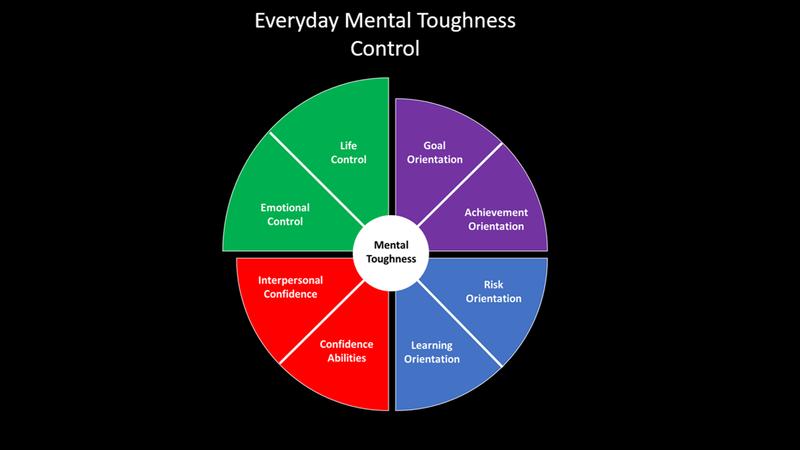Everyday Mental Toughness — Part 1: Control
Everyday Mental Toughness — Part 1: Control
Developing Everyday Mental Toughness – Part 1: Control
This is the first of four short articles concentrating on how to develop each of the four Mental Toughness “sub-components”
I work with the model developed by Professor Peter Clough and Doug Strycharczyk.
In their model the four sub-components are:
Control – life control and emotional control
Commitment – goal orientation and delivery orientation
Challenge – risk orientation and learning orientation
Confidence – interpersonal confidence and confidence in abilities
This article will look at some ideas for developing control
Control is about “Can do” and describes to what extent you believe you control & shape what happens to you and your ability to master your own emotions and the emotions of others.
So, what can we do to control & shape what happens to us?
To answer this, I will focus on “Locus of control”; the degree to which people believe that they have control over the outcome of events in their lives, as opposed to external forces beyond their control.
The original work on locus of control was carried out by Julian Rotter in the nineteen fifties (social-learning theory of personality) but was made famous by Stephen Covey in his book “The seven habits of highly effective people”.
We all have a variety of concerns in our lives – our job, our health, our friends and family, the environment, pesticides in food, global warming, the end of the world, etc.
Within our personal universe of concerns, there are some things (usually the minority) that we can have a direct impact on, a few things we can influence and many things we can only stay concerned about.
We all have a choice about where to focus our attention and energy.
We can choose to focus all our attention on the area that is outside our influence. We can get annoyed about the shortcomings of other people, we can blame our boss, the government, the weather, a rotten childhood, bad luck, or even planetary alignment. This focus leads to more and more blaming and accusing, to feelings of victimisation, “poor me”. This negative way of thinking, accompanied by inaction to change things, results in the circle of influence shrinking
Alternatively, we can decide to focus on things that we can influence. This does not mean just the more immediate or “trivial” concerns. It might mean focusing on those aspects of really huge problems that we can exert some influence over. And influence does not mean direct control; we can influence things in an indirect way, for example in our own personal, daily behaviour.
By focusing attention and energy on our circle of influence, we become increasingly proactive. The energy we expend will undoubtedly become more positive and we will start seeing successes; each small success will motivate us to find new ways of exerting influence. We will stop wasting energy on things we can do nothing about, but direct it towards what we can change. With each step we feel stronger and more creative. Because of this, our circle of influence will start to expand.
What about the second element of control, controlling our emotions?
Firstly, I have to say that I prefer the notion of “mastering” our emotions; control conjures up images of gritted teeth, clenched fists and denial of the existence of the slightest emotion.
To answer how we can master our emotions, I am influenced by two quotes, the first is by Victor Frankl, “Everything can be taken from a man or a woman but one thing; the last of human freedoms — to choose one's attitude in any given set of circumstances, to choose one's own way."
I don’t know who said the second, “All the water in the world, however hard it tries, can never sink the smallest ship unless it gets inside, and all the evil in the world, the blackest kind of sin, can never hurt you in the least, unless you let it in”.
We have two worlds, the “external” word where events happen and the “internal” world where feeling end emotions happen; mastering our emotions is about getting the “right” distance between the two worlds.
Too much distance and we became cold & antipathic and too little distance we become submerged. We need to “own our own emotions” and let others “own their emotions”.
If someone is screaming and shouting at you and telling you that you are an idiot because you missed a deadline and thanks to you the project will be late, you have two options; you can either become angry and shout & scream back explaining that it wasn’t your fault or, you can simply say to yourself “this person is upset & angry, he or she is in an emotional state”. This will give you time and space to respond in a meaningful way, not on impulse – you might not be able to do anything to change the situation, but you can change the way that you respond to what is happening.
Mastering emotions is not about “not having” or “denying” emotions; emotions happen to us – we do not “decide” to be happy, frustrated, angry or sad. Mastering our emotions is about what we do with the physical impact of our emotions; which can in turn have an impact on the psychological and physiological aspects of our emotions – and on the psychological and physiological aspects of the person we are interacting with.
If you feel your emotions starting to overwhelm you, try some controlled breathing and some form of muscle relaxation. Do this “before” your emotions have completely overwhelmed you; when our emotions get the better of us, our rational brain tends to switch off and the “calming down” becomes more difficult.
For anyone who liked the previous version of this article, thank you!
However, I have changed the content to make it coherent with parts 2 (corespirit.com/articles/everyday-mental-tough…) & 3 (corespirit.com/articles/everyday-mental-tough…)
